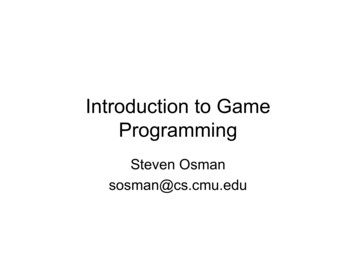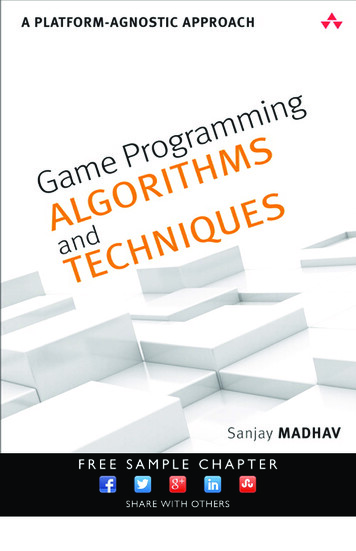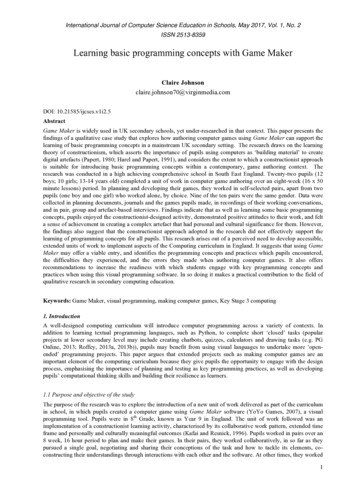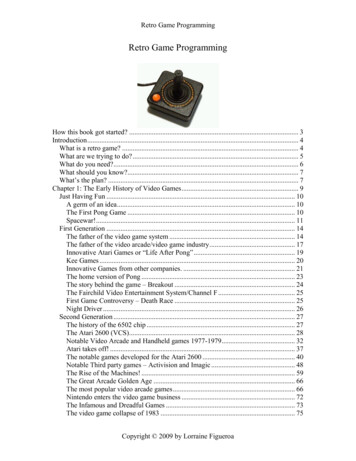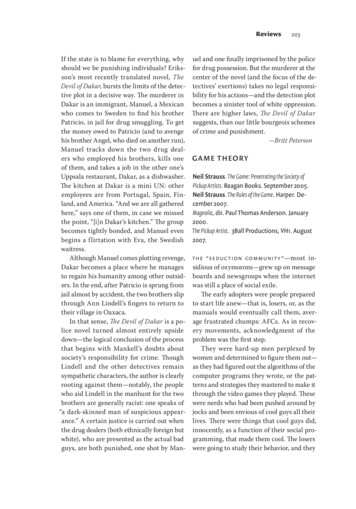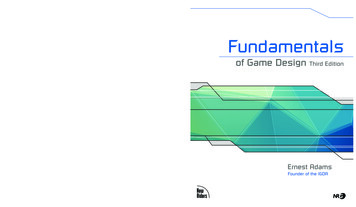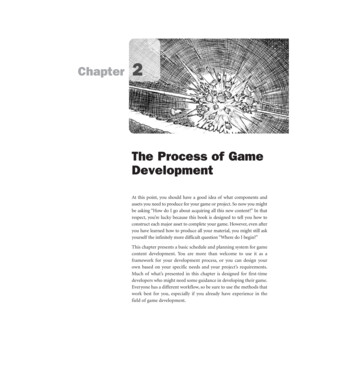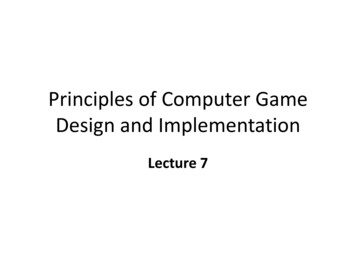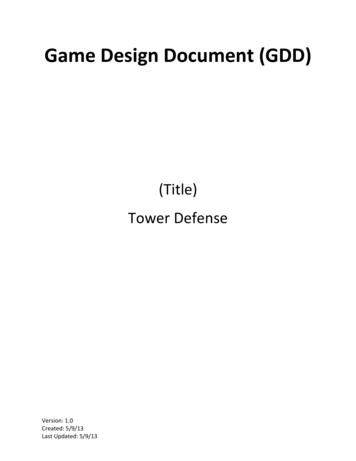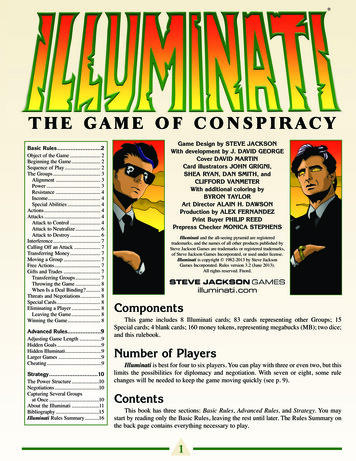
Transcription
THE GAME OF CONSPIRACYBasic Rules .2Object of the Game . 2Beginning the Game. 2Sequence of Play . 2The Groups . 3Alignment . 3Power . 3Resistance . 4Income. 4Special Abilities . 4Actions. 4Attacks. 4Attack to Control . 4Attack to Neutralize. 6Attack to Destroy. 6Interference. 7Calling Off an Attack . 7Transferring Money. 7Moving a Group . 7Free Actions. 7Gifts and Trades . 7Transferring Groups. 7Throwing the Game . 8When Is a Deal Binding?. 8Threats and Negotiations. 8Special Cards. 8Eliminating a Player . 8Leaving the Game. 8Winning the Game. 8Advanced Rules.9Adjusting Game Length .9Hidden Goals .9Hidden Illuminati.9Larger Games .9Cheating.9Strategy.10The Power Structure.10Negotiations.10Capturing Several Groupsat Once .10About the Illuminati .11Bibliography .15Illuminati Rules Summary.16Game Design by STEVE JACKSONWith development by J. DAVID GEORGECover DAVID MARTINCard illustrators JOHN GRIGNI,SHEA RYAN, DAN SMITH, andCLIFFORD VANMETERWith additional coloring byBYRON TAYLORArt Director ALAIN H. DAWSONProduction by ALEX FERNANDEZPrint Buyer PHILIP REEDPrepress Checker MONICA STEPHENSIlluminati and the all-seeing pyramid are registeredtrademarks, and the names of all other products published bySteve Jackson Games are trademarks or registered trademarks,of Steve Jackson Games Incorporated, or used under license.Illuminati is copyright 1982-2013 by Steve JacksonGames Incorporated. Rules version 3.2 (June 2013).All rights reserved. Fnord.illuminati.comComponentsThis game includes 8 Illuminati cards; 83 cards representing other Groups; 15Special cards; 4 blank cards; 160 money tokens, representing megabucks (MB); two dice;and this rulebook.Number of PlayersIlluminati is best for four to six players. You can play with three or even two, but thislimits the possibilities for diplomacy and negotiation. With seven or eight, some rulechanges will be needed to keep the game moving quickly (see p. 9).ContentsThis book has three sections: Basic Rules, Advanced Rules, and Strategy. You maystart by reading only the Basic Rules, leaving the rest until later. The Rules Summary onthe back page contains everything necessary to play.1
BASIC RULESObject of the GameThe object of Illuminati is to take control of the world.You start with a single Illuminati card, representing yourown secret conspiracy. During the game, you take over otherGroups (represented by cards). These Groups are added toyour Power Structure and do your bidding – unless a foetakes them from you. You may win either by controllingenough Groups, or by fulfilling the special goal of your ownIlluminati. See p. 8.If it is a Special card, the player keeps it. He may place itface-down or face-up (whichever he chooses) in front ofhim. However, he must display the card; he can’t hide it in apocket. The other players do not have the right to know whatthe card says, but they do have the right to know how manySpecials each player has.3. Take two “actions,” as explained below.4. Take any “free actions.” Free actions (also explainedbelow) do not count against the two actions a player isallowed during each turn. Free actions may be taken before,between, or after a player’s regular two actions.5. Transfer money. Part or all of the contents of two treasuries may be moved to the treasuries of adjacent Groups.See p. 7.6. Take special-power actions. If the player is theGnomes of Zurich, this is the time when he may redistributehis money between treasuries. If he is the Bermuda Triangle,this is the time when he may reorganize his Power Structure.7. Add targets. At the end of each turn, if the uncontrolled area has fewer than two Groups, draw cards untilthere are two uncontrolled Groups. If a Special is drawn,discard it.Play continues counter-clockwise until a player (or coalition of players) wins by achieving their Goals – see p. 16. Asplay develops, a game might look something like this:Beginning the GameRemove the eight Illuminati cards from the deck; theyhave dark backs to make them easy to find. Place them facedown on the table. Each player draws an Illuminati card,places it face-up before him, and draws its indicated Incomefrom the bank, placing it on the card. Leftover Illuminaticards are not used for the remainder of the game.Shuffle the remaining cards (including Specials) andplace them face-down in the center of the table.Turn four cards face-up and place them in the center ofthe table. (If any Special cards are turned over, bury themin the deck and turn over new Group cards to replacethem.) These four Groups are the original “uncontrolledGroups.”Each player rolls two dice; the player with the highestroll plays first. He follows the Sequence of Play,below: he starts by collecting more income for hisIlluminati Group, turning over one card, and then(probably) trying to take over an uncontrolledGroup with his Illuminati. And the race for worldcontrol is on!Sequence of PlayPlay proceeds in turns. On his turn, a playerdoes the following:1. Collect Income. For each Group that has anIncome, draw that income from the bank. Put themoney directly on that card (the Group treasury).Hint: The game will go faster if players count up theirIncome before their turn starts, and have it readybeside each Group card. Money should not be placedon the card until that player’s turn actually begins.A player may stack his money so only the topone can be seen, or spread them out to flaunt hiswealth.2. Draw a card. If the card is a Group, it isplaced face-up in the center of the table, with theother uncontrolled Groups.Figure 1. The game table. A – The deck of face-downcards; B – Uncontrolled Groups; C – Pile of destroyedGroups; D – Power Structures of the four players in thegame, each built around an Illuminati card; E – The bank.2
AlignmentThere are ten possible political alignments. It is easierfor a Group to control or neutralize Groups with similaralignments, and to destroy those of opposite alignments.Some cards have one alignment, some have several, and afew have none. Meanings of the alignments, for the purposesof this game, are:Figure 2. A typical Power Structure. The center ofany Power Structure is the Illuminati card. Each player starts with one of the eight Illuminati cards; each isdifferent and has its own special abilities. In thisexample, the Illuminati control three Groups directly:the Democrats, the Congressional Wives, and theSouth American Nazis. The South American Naziscontrol two Groups: the KGB and the Cycle Gangs.The Democrats control one Group: the AntiwarActivists.Government – An arm of the U.S. government; its oppositeis Communist.Communist – Inspired by the Soviets or Chinese orAlbanians or somebody; its opposite is Government.Liberal – Politically “left,” whatever that means; its oppositeis Conservative.Conservative – Usually mad at the Liberals; its opposite isLiberal.Peaceful – Philosophically opposed to the use of force; itsopposite is Violent.Violent – Armed and/or dangerous; not necessarily vicious;its opposite is Peaceful.Straight – Socially middle-of-the-road; Middle American;its opposite is Weird.Weird – Peculiar, offbeat, notably different from the neighbors; its opposite is Straight.Criminal – Extorting money from citizens through force orthreat, and/or breaking the law professionally; there isno opposite.Fanatic – Adhering to a limited system of beliefs in defianceof all others; any two Fanatic Groups are considered“opposite” to each other.Illuminati cardPowerThe Power number shown on the card is a measure of itsability to dominate other Groups. The higher the number, thegreater the Power. If a Group has two numbers (for example:7/4), the first number is its regular Power and the secondrepresents the portion of that Power which can be used toassist another Group in an attack (Transferable Power).The GroupsThe basic elements of Illuminati are the Group cards,ranging from the Illuminati themselves to the Yuppies andthe Boy Sprouts. (Any resemblance to real organizations ispurely satirical in nature.) Each Group has certain characteristics. See Figure 3 below.❷❸❹❻❶❺Figure 3. The Mafia card. Each card, except for Illuminati, has anarrow pointing inward (1). When a card becomes part of a PowerStructure, this arrow is placed next to the Group which controls it.There may also be one to three arrows pointing outward (2). Thesearrows show the potential to control other Groups. The Mafia, withthree arrows pointing outward, is very powerful. If a Group has noarrows pointing outward, it will have no Power at all.The Group’s name (3) is at the top of the card. If it has anyspecial abilities, they will be listed just below (4). Its politicalalignments will be shown at the lower right (5). Its characteristicsin terms of Power, Resistance, and Income are shown at the lowerleft (6).3
A card with no Power cannot attack. A few Groups havetransferable power only (Power 0/1, for instance). Thismeans they cannot attack, but can help another Groupattack.Other abilities apply only to the card itself. For instance,the Mafia have a 3 to control any Criminal card. Thismeans you get a 3-point bonus when trying to take over aCriminal Group with the Mafia. If you try to take over aCriminal Group with another card, the fact that you hold theMafia makes no difference. Note, though, that a specialbonus like this is in addition to any regular bonus a Groupgets for alignment. The Mafia would also have a 4 bonusto control other Criminal cards because its own alignmentis Criminal (see p. 5). Thus, it would have a total of 7 forcontrol of other Criminal cards!For oddball special abilities like that of the IRS, followthe instructions on the card.ResistanceThis is a measure of a Group’s ability to resist domination. The lower its Resistance, the easier it is to take over . . .and the harder it is to protect when you control it.The Illuminati Groups have no Resistance number,because they cannot be attacked directly.IncomeMoney is measured in Megabucks (MB). At the beginning of your turn, each Group you control collects theamount listed on its card. This income is placed directly onthat card, becoming part of the Group’s treasury. If a cardhas no Income, it gets no money. Uncontrolled Groups getno Income.Two cards have a special Income. The IRS gets itsIncome by taxing each of the other players 2 MB on theowning player’s turn. The Post Office costs 1 MB per turn tocontrol (paid by their master or their Illuminati).ActionsThere are three types of actions: an attack, a moneytransfer, and moving a Group. Each action must be completed before beginning another. A player may elect to take noactions (not even free actions, free money transfers or special actions) and collect 5 MB for his Illuminati treasuryinstead. Actions cannot be saved for later turns.AttacksThe most important actions in Illuminatiare attacks. In an attack, a Group uses itsPower, and probably its money, in an attemptto either control, neutralize, or destroyanother Group.Illuminati cards themselves can attack,but cannot be attacked. No Group, except theUFOs, can attack more than once per turn.Attack to ControlThis attack may be made against anyother Group in play except another Illuminatior a Group you already control. The attacking Group must have at least one outwardpointing arrow free. If a Group has no openoutward-pointing arrow (either because allare being used or some are blocked), it cannot attempt tocontrol another Group.To attack, the player announces which Group is attacking, which one is being attacked, and the type of attack.(Example: “The KKK, assisted by the CIA, will attempt tocontrol the Yuppies.”)The success of the attack is determined by rolling twodice. To find the roll required for a successful attack, subtract the defending Group’s Resistance from the attackingGroup’s Power. Example: If a Power of 6 attacks aResistance of 2, it can succeed only on a roll of 4 or less. Ifa Power of 10 attacked that same Resistance of 2, it wouldsucceed on an 8 or less, giving it a much better chance.Special AbilitiesAll Illuminati, and some other Groups, have “specialabilities” shown on their cards. There are two kinds ofspecial abilities.“Any attempt” abilities give an extra power to the holder of the card. Any attempt by that player to do that thing,regardless of which Group tries it, will receive the indicatedbonus. For instance, if you control the Cycle Gangs, anyattempt you make to destroy another Group with any of yourGroups will get a 2 bonus. This ability comes to you assoon as you take over the Cycle Gangs, and is lost as soonas you lose them. A Group may give a bonus on “any attemptto control,” even if it has no outgoing arrows.4
10Automatic Failure. A roll of 11 or 12 results in automaticfailure of the attack, no matter how much Power wasinvolved.Aiding Attacks. All Illuminati, and some other Groups,have transferable power. If a Group has two Power numbersseparated by a slash (like 5/2), the second number is itstransferable power. If a Group does not attack during a turn,it may use its transferable power to aid an attack made byany other Group in its Power Structure.Any number of Groups may aid one attack by addingTransferable Power. However, any one Group may participate in only one attack per turn. (Exception: The SpecialAbility of the UFOs lets them participate in two attacks perturn.) Example: A Group with a power of 6, aided by anotherGroup with a transferable power of 4, is attacking a Groupwith a resistance of 3. The attacker has a total power of 10(6 plus 4), and will have to roll a 7 or less (10 minus 3) tosucceed.When an attack is announced, all transferable power tobe used in that attack must be announced before any moneyis spent (see below) to support the attack. No transferablepower may be added in the middle of the attack.Alignment of the Group(s) transferring power does notmatter.Power Structure Position. If a Group is already controlled by an opponent, it may be harder to control. Thecloser it is to the Illuminati who control it, the more of abonus it gets to Resistance (or to Power if someone tries todestroy it). If it is adjacent, it gets a 10! If it is one Groupaway, it gets a 5. If it is two Groups away, it gets a 2. 2 10 5 10 10Special Powers. Some Groups’ special powers (shownon the card) will help them attack or defend against certainopponents.Spending Money To Attack. The attacker may alsoimprove his chances by using some of his money in theattack. Each MB spent (returned to the bank) adds one pointof Power to that attack. However, all Transferable Power tobe used must be added and announced before any money isspent.Attacking money may be spent from both the attackingGroup’s treasury and the Illuminati treasury. Other Groupsin the Power Structure cannot spend money to aid the attack.Example: In the instance above, the attacker was afraid hemight not roll a 7 or less. So he spent 3 MB. Now he needsto roll a 10 or less, which is much easier.Once the roll needed to succeed has reached 10, additional spending will not improve the attacker’s odds; an 11or 12 always fails. But additional money or power can stillbe useful. For instance, if an attacker uses enough moneyand power to exceed the target’s resistance by 20, thedefender would have to spend 20 MB to get the attackingroll back down to zero again!Spending Money To Defend. If the defending Group iscontrolled by another player, the defender may counter anattack by spending some of his own money. Resistance tothat attack will increase by two for each MB spent from thedefending Group’s treasury, and by one for each MB spentfrom his Illuminati treasury. Other Groups cannot participate. All money spent goes immediately to the bank.Example: In the instance above, the defender has 3 MB onthe defending Group. He spends it all. It counts double,so instead of a 10, the attacker now needs to roll a 4.The attacker may then commit more money to offset thedefender’s spending. 5 5 200Figure 4. Resistance bonuses forlocation in power structure. Notethat Groups more than 3 away fromthe Illuminati get no bonus at all.Alignments. The alignments of the attacking and defending Groups are also important. Identical alignments makecontrol easier; opposed alignments make it harder. If theGroups have any identical alignments, add 4 to the attacker’s effective Power for each identical alignment. If theyhave any opposite alignments, subtract 4 for each.Example: A Weird, Communist Group is trying to control aStraight, Government Group. Two sets of opposite alignments subtract 8 from the attacking power on this attack.5
Continued Spending. Theattacker and defender can each goback and forth, putting in moremoney, as long as they are able.When no player is willing to spendmore money to affect the attack, thedice are rolled to determine theresult. Remember: a roll of 11 or 12results in automatic failure, no matter how much power or money isused in the attack.Results of the Attack. If theattack fails, the defending Groupremains where it was.If an Attack to Control is successful, the target Group is capturedand added to the attacking player’sPower Structure. It is placed next toits captor, with its inward-pointingarrow next to an outward-pointingarrow of the capturing Group,which becomes its new “master.”The controlled Group is now called a “puppet.” Puppets maythen capture puppets of their own, and so on!It does not matter if a card is upside-down or sideways,as long as the arrows line up properly.If the captured Group already had puppets of its own,they are also captured. When placed in the attacker’s PowerStructure, they should keep the same position, relative totheir own master, that they had originally. If that is notpossible because of overlaps with cards the attacker alreadyhas, he may rearrange any new cards that overlap, as long asthey are still controlled by the same Group. New Groupswhich still cannot fit are dropped and become uncontrolled.Half of the money remaining in the captured Groups’treasuries (round down) goes with them to the new owner;the rest is returned to the bank.The Group which attacked may immediately transferany or all of its treasury to the Group it just captured. This isnot a separate action, but is considered part of the attack.Such a transfer is often a good idea, either to protect the newGroup from attack or to let it mount an attack of its own.If a player’s first action is an attack, and it fails, theplayer may attack the same Group again as his secondaction. However, no individual Group (except the UFOs)may attack twice in a turn.A newly-controlled Group may attack (or aid an attack,or use its special ability) on the same turn in which it wasacquired.2. The attacker gains an additional 6 bonus.3. The attacker does not need anopen control arrow.4. If the attack succeeds, the targetGroup and any subordinates areplaced in the uncontrolled area. Alltheir money is returned to the bank.Attack to DestroyThis is identical to an “Attack toControl” except:1. Instead of rolling “Power minusResistance,” the attacker rolls “Powerminus Power.” In other words, thedefending Group defends with itsPower rather than its Resistance. (Itscloseness to its Illuminati, as shownon p. 5, still counts for defense.)A Group with no Power cannot bedestroyed except by the Special cardWhispering Campaign. The factorswhich keep powerless Groups from organizing enough tocontrol other Groups also make them too diffuse to wipe out.2. Groups with different philosophies destroy each othermore easily. An Attack to Destroy gets a 4 bonus for everyopposite alignment, and a -4 for every identical alignment.3. A Group does not need an open control arrow in orderto attempt destruction.4. If the attack succeeds, the target Group goes to the“dead pile.” Its subordinate Groups are not destroyed, butbecome uncontrolled. It can be revived only by the Specialcard Media Campaign.5. You may try to destroy a Group you already control.In this case, the target’s closeness to its Illuminati does notprotect it. But no Group may attack itself, or aid an attemptto destroy itself!Attack to NeutralizeThis is identical to an “Attack to Control” except:1. The target must be a Group that is already controlledby another player.6
InterferenceA player may interfere in an attack, either by helping theattacker or by opposing him. To do so, he announces who hewill help, and then contributes money from his Illuminatitreasury only. This money goes to the bank. It affects theneeded die roll by 1 for each MB spent.An attacker may prevent Interference by declaring anattack “Privileged.” To do this, he must discard any oneSpecial card and call “Privilege!” when first declaring theattack. No one can interfere either for or against a PrivilegedAttack.The Bavarian Illuminati have the Special Ability todeclare one attack per turn Privileged, at the cost of 5 MBpayable from their Illuminati treasury. If that player wishesto use his Special Ability, he must declare the Privilege andpay the 5 MB when he first announces the attack.Privilege may be abolished by use of the Special cardDeep Agent, or by discarding two Special cards (see p. 8). Ifthe Privilege is abolished, it cannot be reinstated on that attack.Free ActionsAfter a player announces an attack, he can change hismind and call it off – until he puts some money down. Oncehe actually takes money from his treasury and puts it in thebank, the attack is committed. It must be played out, and itdoes count as an action.If the attacker spends no money, the attack is committedwhen another player spends money (either for or againsthim) or when the attacker rolls the dice.Some things may be done during the “action” part of aturn without counting as “actions.” These include:Dropping Groups – removing a Group from your PowerStructure and returning it to the uncontrolled area. (Itspuppets must also become uncontrolled.)Aiding an attack – using Transferable Power to assistanother Group. This counts as part of the attack being aided.Giving away a Special card or money – this may be doneat any time, not just during your turn. Money may betransferred only between Illuminati treasuries when it goesto another player.Using a Special card – follow the instructions on thecard. (Exception: Using the Bribery card is a regular action.)Transferring MoneyGifts and TradesCalling Off an AttackGroups, special cards, and money may be transferredbetween players: traded, sold (that is, traded for money) orgiven away. Cash or special cards may be transferred anytime (except when a privileged attack is under way). Thisdoes not count as an action. When cash is transferred, it mustcome from an Illuminati card and go to another one. OtherGroups cannot give their money to another player, or receivemoney from another player.A Group may, as an action, transfer any of its money toan adjacent Group – either its master, or a puppet. A playermay make two money transfers as part of his turn (Sequenceof Play, p. 2). But if necessary, he can also make a transferas a regular action. By successive transfers, the same moneymay be moved two or more Groups in one turn.Moving a GroupA player may, as an action, reorganize his PowerStructure by moving a Group to a vacant outgoing controlarrow. The new control arrow may be on the Group’s master,or any other Group the player controls. If the moving Grouphas any puppets, then they (and their own puppets, and soon) are also moved.Cards may not overlap. If moving a Group would causesome of its puppets (or theirs) to overlap, any of them mayalso be moved to different control arrows, as long as theyare still controlled by the same master. Any puppet thatcannot be prevented from overlapping is lost. It, and its ownpuppets, are returned to the uncontrolled area.Transferring GroupsGroups may only be transferred if it is the turn of one ofthe players involved. On your turn, you may give a Groupaway (even if you get nothing in return), sell or trade it, ortrade something (cash, cards or Groups) to get a Group orGroups in return. Each Group exchanged counts as an actionfor the player whose turn it is, whichever way the Groupmoves. So if you trade a Group for a Group on your turn,that counts as two actions – one to move the first Group, oneto move the second one!You may only give a Group away with the permission ofthe player who receives it!7
Special CardsEach of these cards gives an advantage to the player whodraws it. They may be kept face-down or shown, as the player wishes – but he must keep them spread so other playerscan see how many specials he has. Special cards may betraded, sold, or given away at any time; this is a free action.Each Special may be used only once. Some may be usedat any time; others have restrictions, stated on the card.Playing a Special is not an action unless the card says it is.After a card is used, it is discarded.Any special card may also be discarded to make anattack “privileged” – see p. 7. Any two special cards may bediscarded together, by the same person, to abolish someoneelse’s privilege. If Secrets Man Was Not Meant To Knowis used to cancel one of those cards, the other one is lostunless the player can replace it! (Remember that no one mayexchange or give away Specials after privilege has beendeclared. And once an attack loses its privilege, it may notget it back.)If two specials are played and one contradicts the other(for example, Assassination and Murphy’s Law), the lastcard played is the one that governs.When a Group is transferred to another player, itspuppets (if any) must go with it, along with all treasuriesinvolved. The player receiving the Group must immediatelyfit it, and its puppets, into his power structure, exactly asfor moved or captured Groups – see above. If overlapscannot be avoided, the player must eliminate them bychoosing one or more overlapping card, new or old, tobecome uncontrolled.Throwing the GameNo player may simply “throw” the game to another bygiving them enough Groups, money, etc. to let them win. Atrade that lets both players win is perfectly legal. It is alsolegal to trade with another player at the beginning of yourturn and then surprise everyone, including the person youtraded with, by revealing a special card or pulling off anunexpected attack.This prohibition requires a certain amount of interpretation and honor among players. The intent is just to keep anyone player from, for whatever reason, giving away the gamein one fell swoop. A losing player cannot necessarily justdecide who will win. (On the other hand, by attacking someone, they may very well decide who loses.)Eliminating a PlayerA player is eliminated if, at any time after his third turn,he controls no Groups except his Illuminati. His moneygoes to the bank. Exception: If the Servants of Cthulhudestroy their own last Group, and in doing so, achievetheir Special Goal (eight Groups destroyed), they are notdestroyed themselves . . . they win!Leaving the GameIf a player drops out, his Groups go uncontrolled andtheir treasuries go to the bank. His Illuminati card is takenout of play.When Is a Deal Binding?When two players agree to a deal, it is binding if theymake the exchange immediately. A deal is not binding if itinvolves an exchange of one thing now for something in thefuture. Example: If you say “I’ll give you 10 MB for the BoySprouts, right now,” and the other player gives you the BoySprouts, you have to pay. But if you say “If you give me theBoy Sprouts next turn, I’ll pay you 10 MB next turn,” andhe gives you the Group, you don’t have to pay next turn,unless you want to!Winning the GameThe game ends when, at the end of a turn (his own orsomeone else’s) a player meets one of his Goals. If two ormore players both meet their Goals at the same time, theyshare the victory, dividing the world between them.The Basic Goal is the same for all players: to control acertain number of Groups. This number depends on thenumber of players at the beginning of the game. If a playerleaves or is eliminated, the number of Groups required towin (see p. 16) does not change.The Special Goal is another way a player can win. Thisis different for each player, representing a specific goal oraim of that particular Illuminati. A player wins if he meetshis Special Goal at the end of any turn.All the Goals are listed on the back page, for easyreference.Threats and NegotiationsAny agreement between players, secret or otherwise, ispermitted as long as it does not actually violate the rules ofthe game. For some suggestions, see the Advanced Rulessection on the next page.In particular, it is perfectly legal to try to change an opponent’s mind, by promises or threats, about his planned action.8
ADVANCED RULESThese optional rules will provide you with many newways of playing Illuminati. Add them one at a time or in anycombination you like. The game may become as in
money directly on that card (the Group treasury). Hint:The game will go faster if players count up their Income before their turn starts, and have it ready besideeach Group card. Money should not be placed on the card until that player’s turn actually begins. A player may stack his money s
